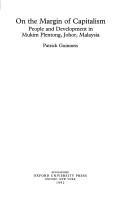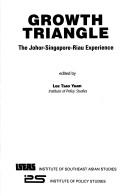| Listing 1 - 10 of 20 | << page >> |
Sort by
|
Digital
ISBN: 9789814786966 Year: 2017 Publisher: Singapore ISEAS-Yusof Ishak Institute
Abstract | Keywords | Export | Availability | Bookmark
 Loading...
Loading...Choose an application
- Reference Manager
- EndNote
- RefWorks (Direct export to RefWorks)

ISBN: 0195885562 Year: 1992 Publisher: Singapore New York Oxford University Press
Abstract | Keywords | Export | Availability | Bookmark
 Loading...
Loading...Choose an application
- Reference Manager
- EndNote
- RefWorks (Direct export to RefWorks)
Book
ISBN: 9789814722186 9814722189 Year: 2017 Publisher: Singapore NUS Press
Abstract | Keywords | Export | Availability | Bookmark
 Loading...
Loading...Choose an application
- Reference Manager
- EndNote
- RefWorks (Direct export to RefWorks)
Matelief, Cornelis, --- Travel --- Johor (Malaysia) --- Singapore --- History
Digital
ISBN: 9789814786249 Year: 2017 Publisher: Singapore ISEAS-Yusof Ishak Institute
Abstract | Keywords | Export | Availability | Bookmark
 Loading...
Loading...Choose an application
- Reference Manager
- EndNote
- RefWorks (Direct export to RefWorks)
Digital
ISBN: 9789814695596 Year: 2016 Publisher: Singapore ISEAS Publishing
Abstract | Keywords | Export | Availability | Bookmark
 Loading...
Loading...Choose an application
- Reference Manager
- EndNote
- RefWorks (Direct export to RefWorks)
Southeast Asia --- Singapore --- Johor --- Indonesia --- Malaysia
Book
ISBN: 981476289X 9814762881 Year: 2017 Publisher: Singapore : ISEAS-Yusof Ishak Institute,
Abstract | Keywords | Export | Availability | Bookmark
 Loading...
Loading...Choose an application
- Reference Manager
- EndNote
- RefWorks (Direct export to RefWorks)
Many scholars on Malaysia have recognized that Salafism-Wahhabism has penetrated substantially into the countr's political and social life. The southern state of Johor has always been considered, and remains, the bastion of kaum tua, with its religious institutions dominated by ulama (religious scholars) who are traditionalist in character but tolerant of religious practices that are infused with local culture and mysticism. These scholars have also tended to maintain conservative attitudes on gender issues, inter-religious relations, and intra-faith differences. The Sultan of Johor appoints the Mufti whose primary role is to issue fatwas (religious rulings) and be the ex-officio of the Johor Islamic Religious Council, the highest Islamic body in the state. Johor's Muftis are dominantly political quietists, and loyal to the ruling family. Occasional interventions by the Sultan of Johor in the religious sphere have proved crucial in ensuring that the state maintains its Malay character. The Sultan also acts to protect the state's religious institutions from encroachment by the federal government.
Islam --- Mohammedanism --- Muhammadanism --- Muslimism --- Mussulmanism --- Religions --- Muslims --- Johor (Malaysia) --- Darul Ta'zim (Malaysia) --- Johor Darul Ta'zim (Malaysia) --- Johore (Malaysia) --- Kerajaan Negeri Johor Darul Ta'zim (Malaysia) --- Negeri Johor (Malaysia) --- Negeri Johor Darul Ta'zim (Malaysia) --- State of Johor (Malaysia) --- State of Johore (Malaysia) --- Dzhokhor --- Johor --- Politics and government.
Book
ISBN: 9814762806 9814762792 Year: 2016 Publisher: Singapore : ISEAS-Yusof Ishak Institute,
Abstract | Keywords | Export | Availability | Bookmark
 Loading...
Loading...Choose an application
- Reference Manager
- EndNote
- RefWorks (Direct export to RefWorks)
Malaysia's sultans have in recent years taken on an increasingly discernible role in the country's political life. However, rather than something new, the rulers' resurgence should be viewed as part of a longer term negotiation over the precise boundaries of their role. The Sultan of Johor, Ibrahim Ismail, is arguably the most visible of the country's rulers at present. Since ascending to the throne in 2010, he has constructed a prominent media profile and been active in many areas of policy-making. Sultan Ibrahim Ismail has also weighed in on national-level issues, such as the quality of national education and bilateral relations with Singapore. While the more ceremonial aspects of his actions are inspired by the pivotal role traditionally played by Malay rulers, the more operational aspects hark back to the colonial era when Johor had a reputation for modern administration, well-developed infrastructure, and a high degree of autonomy. At its core, the Sultan raises questions about Malay leadership, and may revive a long-standing contest between the rulers and the political elite, sometimes referred to as a battle between "princes and politicians".
Sultans --- Kings and rulers --- Ibrahim Ismail ibni Tunku Mahmood Iskandar, --- Iskandar, Ibrahim Ismail ibni Tunku Mahmood, --- Ibrahim, --- Ibrahim ibni Almarhum Sultan Iskandar, --- Johor (Malaysia) --- Darul Ta'zim (Malaysia) --- Johor Darul Ta'zim (Malaysia) --- Johore (Malaysia) --- Kerajaan Negeri Johor Darul Ta'zim (Malaysia) --- Negeri Johor (Malaysia) --- Negeri Johor Darul Ta'zim (Malaysia) --- State of Johor (Malaysia) --- State of Johore (Malaysia) --- Dzhokhor --- Johor --- Politics and government.
Book
ISBN: 9814881287 9814881279 Year: 2020 Publisher: Singapore : ISEAS-Yusof Ishak Institute,
Abstract | Keywords | Export | Availability | Bookmark
 Loading...
Loading...Choose an application
- Reference Manager
- EndNote
- RefWorks (Direct export to RefWorks)
In 1990, the Malaysian state of Johor-along with Singapore and the Indonesian island of Batam-launched the Growth Triangle to attract foreign direct investment. For Johor, this drive was very successful, transforming its economy and driving up income levels. Today, Johor is one of Malaysia's "developed" states, housing large clusters of electrical and electronics, food processing, and furniture producing firms. While welcome, this structural transformation has also entailed important challenges and strategic choices. After three decades, Johor's manufacture-for-export model is under question, as it faces increasing competition and flat-lining technological capabilities. In response, the state has sought to diversify its economy through strategic investments in new, mostly service-based activities. Yet, Johor retains pockets of excellence in traditional sectors that also require support and policy attention. The state's economic transformation has also been accompanied by far-reaching political, social, and environmental change. Not least, Johor's growing population has generated demand for affordable housing and put pressure on public services. The strain has been exacerbated by workers from other states and overseas. These demographic factors and large-scale projects have, in turn, put stress on the environment. Building on earlier work by the ISEAS - Yusof Ishak Institute on the Singapore-Johor-Riau Islands Cross-border Region, this book focuses on this important Malaysian state, as it deals with important domestic challenges on one hand and strives to engage with international markets on the other.
Industries --- Johor (Malaysia) --- Darul Ta'zim (Malaysia) --- Johor Darul Ta'zim (Malaysia) --- Johore (Malaysia) --- Kerajaan Negeri Johor Darul Ta'zim (Malaysia) --- Negeri Johor (Malaysia) --- Negeri Johor Darul Ta'zim (Malaysia) --- State of Johor (Malaysia) --- State of Johore (Malaysia) --- Dzhokhor --- Johor --- Economic policy. --- Investments, Singaporean --- Economic conditions. --- Politics and government. --- Investments, Singapore --- Singaporean investments --- Industrial production --- Industry --- Economics --- Industries, Primitive

ISBN: 9813016116 Year: 1991 Publisher: Singapore Institute of Southeast Asian Studies
Abstract | Keywords | Export | Availability | Bookmark
 Loading...
Loading...Choose an application
- Reference Manager
- EndNote
- RefWorks (Direct export to RefWorks)
Economic conditions. Economic development --- International economic relations --- Singapore --- Johor
Book
ISBN: 9789971695705 Year: 2011 Publisher: Singapore National university of Singapore
Abstract | Keywords | Export | Availability | Bookmark
 Loading...
Loading...Choose an application
- Reference Manager
- EndNote
- RefWorks (Direct export to RefWorks)
Portuguese --- History --- Aceh (Sultanate) --- Johor --- Malacca (Malacca) --- History.
| Listing 1 - 10 of 20 | << page >> |
Sort by
|

 Search
Search Feedback
Feedback About UniCat
About UniCat  Help
Help News
News